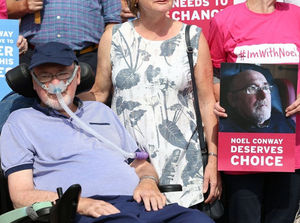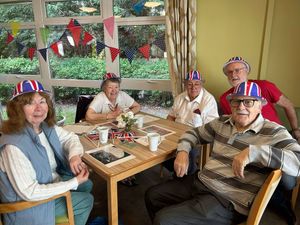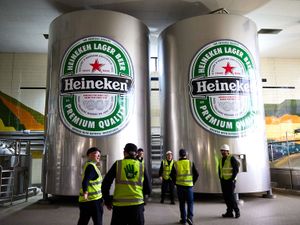Noel Conway: Terminally ill Shrewsbury man 'faces unbearable suffering' as he loses legal fight on assisted dying
A terminally ill Shrewsbury man says he is facing 'unbearable suffering' after High Court judges today rejected his challenge against the law on assisted dying.

After the ruling, retired lecturer Noel Conway said he is now planning to appeal the judgement and added: "I am told the only option I currently have is to effectively suffocate to death by choosing to remove my ventilator, which I am now dependent on to breathe for up to 22 hours a day.
"There is no way of knowing how long it would take me to die if I did this, or whether my suffering could be fully relieved. To me, this is not choice – this is cruelty.
“This decision denies me a real say over how and when I will die."
Mr Conway was diagnosed with motor neurone disease in 2014.
He wanted a declaration that the Suicide Act 1961 is incompatible with article 8 of the European convention on human rights, which relates to respect for private and family life, and article 14, which protects from discrimination.
But Lord Justice Sales, Mrs Justice Whipple and Mr Justice Garnham ruled that the courts do have the authority to make such a declaration to make a declaration of incompatibility between the 1961 Suicide Act and human rights legislation.
Mr Conway, who did not attend the hearing, said: “As I approach the end of my life, I face unbearable suffering and the possibility of a traumatic, drawn out death.
"Travelling to Switzerland is no longer a viable option and I cannot put my family or doctors at risk of prosecution by asking for their help here at home.
"Knowing I had the option of a safe, peaceful assisted death at a time of my choosing would allow me to face my final months without the fear and anxiety that currently plagues me and my loved ones. It would allow me to live the rest of my life on my own terms, knowing I was in control rather than at the mercy of a cruel illness.
“Throughout this case I have been overwhelmed by the outpouring of support the public has shown me. I know that this fight is important not just to me, but thousands of others. I am undeterred by the decision and will appeal it with the support of my legal team and Dignity in Dying.”
Video from the appeal hearing in July:
Sarah Wootton, chief executive of Dignity in Dying, said: “Whilst we are disappointed with the judgment, it does confirm that the courts have the authority to declare the current law inconsistent with our human rights. Noel does not accept the death that the current law forces him to have, and neither do we, which is why Dignity in Dying will support Noel every step of the way to take this case on to the appeal courts."
It was the first challenge to the Suicide Act of 1961 since the case of Tony Nicklinson, who suffered from paralysis after a stroke. That was ultimately dismissed in June 2014 by the supreme court, which said it was a matter for parliament to decide.
After debates in both houses, parliament decided not to provide for legislative exceptions to the 1961 act.
After debates in both Houses, Parliament decided, at least for the moment, not to provide for legislative exceptions to the 1961 Act.





